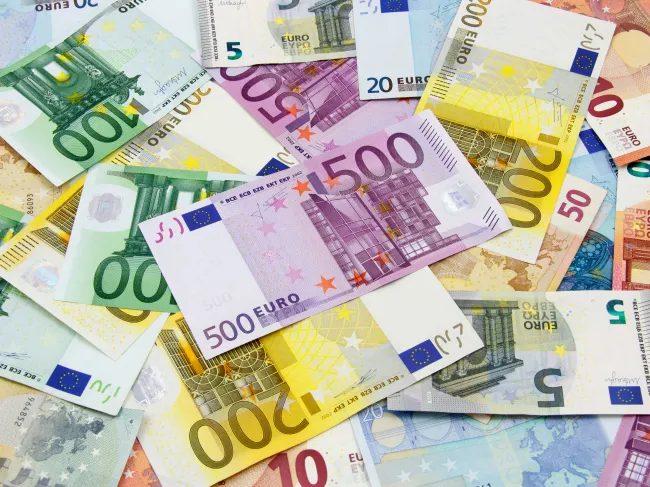In June 2024, the European Central Bank (ECB) began lowering its key interest rate. Borrowing costs were reduced from 4.5 per cent to 2.5 per cent in March 2025—which, after accounting for the officially measured inflation, is almost zero per cent in real terms. The time when euro deposit holders could achieve a positive real interest rate was very brief.
What is the reason for the interest rate cuts? ECB decision-makers explain to the public that inflation is declining—in February, the rise in consumer goods prices in the euro area was 2.4 per cent—and that would justify lower interest rates. However, the real reason is something else.
The euro area economy can no longer deal with elevated interest rates. Many countries suffer from weak economic growth, especially Germany, the largest economy in the euro area, is literally in a downward spiral.
This is not surprising: The interventionist-socialist policies in many European countries, particularly in Germany, are suffocating, or rather destroying, the forces of economic growth.
Public finances are in especially bad shape, often out of control. Public debt in the euro area is close to 90 percent of GDP. Italy’s debt-to-GDP ratio is 137 per cent, and France’s is just over 112 percent.
While Germany’s debt-to-GDP ratio is still at just 62 percent, political forces are now working on drastically raising the country’s debt load—up to 1 trillion euro or around 24 per cent of the country’s GDP.
Given the enormous debt levels (not even considering pension obligations), high interest rates are politically undesirable. Keep in mind: A debt-to-GDP ratio of 90 percent, financed at an interest rate of, say, 3 per cent amounts to interest payments of 2.7 percent of GDP—well above the growth rate the economies can achieve. In simple terms: Public debt then costs citizens and businesses more than it yields.
To plug their budget holes, European governments must raise taxes, cut spending, pay their bills with more money—i.e., imposing an even higher inflation tax—or pursue a combination of these measures.
Raising taxes and cutting spending is politically unpopular. It is much easier for governments to issue new debt, which is monetized by the ECB and commercial banks, so that additional spending can be paid for with newly created euros.
It is now easy to understand why the ECB is lowering interest rates (regardless of whether official inflation is above the promised 2 percent target or not): Governments in the euro area wish to rely on money printing, on inflation, and the ECB is acting accordingly.
And something else is happening right now in Europe, and you don’t need to be a rocket scientist to understand it: “Emergency situations” are exactly what is in the interest of politicians. For then they can expand their powers very quickly and massively, doing things that would not be possible in normal times. Just think of the covid era. Of course, the ultimate emergency is war.
Those in power even have a strong incentive to exaggerate or fabricate war threats, for the fear of war typically makes the broader populations succumb to the dictates of the state. The incentive is naturally stronger if the state is on the brink of bankruptcy, and if it is politically undesirable to bring public finances back to health in an honest way.
What has been said so far should give you a reasonable explanation for what is currently happening in Europe, in Brussel as well as in many national parliaments: Drumming up the threat of war, calling for more military spending, preparing the public for war with Russia. While the political forces in Europe—in London, Berlin, and Paris—remain unshakably committed to the idea of a New World Order, the movement of the “globalists” has suffered a serious setback in the US.
And as the new US administration under Donald Trump even threatens to turn off the financial spigot, the globalists seek their enormous funding needs to be covered by European taxpayers. Hence the growing war rhetoric and huge debt funding initiatives.
What does this mean for inflation and interest rates in the euro area? The EU countries will most likely continue with their debt-financed rearmament plans, regardless of a peace settlement in Ukraine; European globalist-minded politicians and special interest groups will not miss the chance to get hold of new money.
The ECB can be expected to buy up the new debt, increase the money supply, and ensure that nominal euro interest rates stay low through controlling bond yields. The expansion of the money supply will be accompanied by spending that adds little or nothing to productivity; expenditures that are mostly wasteful and lead to growing corruption and mismanagement.
It will lead to significant upward pressure on goods prices—and so official inflation numbers will pick up again sooner or later.
Government interference in peoples’ lives will increase, leading to a kind of command economy that will, because of its inefficiency, further erode Europe’s international competitiveness—especially so as capital and talented people will emigrate to, say, the US. What is to be expected is an elevated level of inflation in the euro area—not yet immediate hyperinflation (that is, goods prices rising at ever-increasing rates due to an uncontrolled rise in the money supply), but rather a permanently higher inflation rate of, say, 4 to 6 percent?
At the same time, the ECB will most likely fix euro capital market interest rates at around 3 percent, so that the real interest rate will be negative, debasing the purchasing power of the euro, the real value of government debt, destroying peoples’ savings.
In other words: The ECB will return to financial repression, gradually sucking savers dry, empowering the state, and sooner or later (though probably not immediately) a true crisis, one that deserves the name, will arrive.


